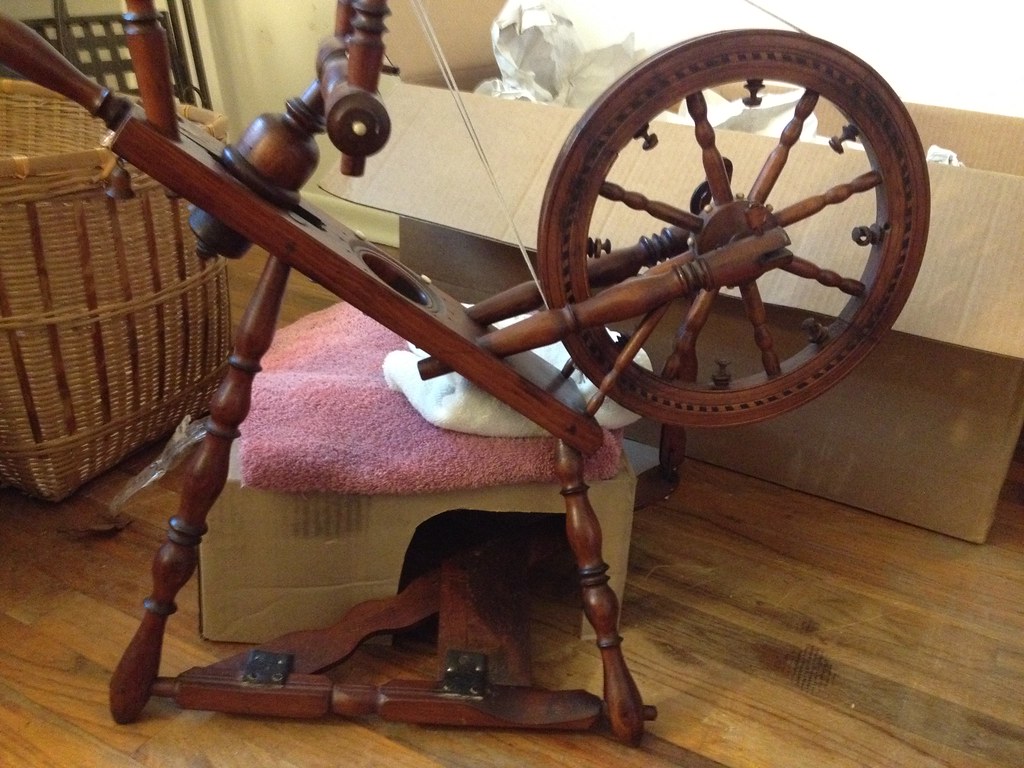Home built warping board Take Two is working well. I've been winding warps for a shawl from handspun Border Leicester wool, and I just ordered another pound of the stuff for the weft from SuDan Farm. Turns out that a big shawl takes a lot of yarn - who knew? It's a good thing that I spin by the pound! It's also a good thing that I spin on a Canadian Production Wheel that just plows through wool.
Sadly, I didn't take photos of today's adventure. I went to my friend's workplace, which is a local college's veterinary school, and got to take as much fleece as I wanted out of the barn. All of the sheep were sheared on Friday, and, while they're a motley mix and not raised for handspinners, I think that I got some decent Romney cross wool from the lot. I brought home four fleeces and a parking citation... and a Navajo rug that I found for $10 at Goodwill!
More photos to come when there's more natural light - a friend gave me a Norwegian Princess spinning wheel as a maybe long-term loan, maybe to keep, who knows? It's dreamy.
A cosy home for spinning, knitting, and wool processing - the place for heritage wool from the Pacific Northwest, handspun wool yarn, and backyard angora rabbit fiber
Monday, April 30, 2012
Wednesday, April 25, 2012
Inkle weaving!
I think that it took me two hours from start to finish to weave a 5' long band. I have big plans to weave dog leashes out of Icelandic and Navajo churro sheep's wool with colorwork from the natural colors of the fleeces. This band is rather too soft to be a durable leash, but it will be my prototype for sewing the ends, thinking about the length of the leash, etc.
Friday, April 20, 2012
Weaving on the Allen loom
My friend Xtine sold me her grandmother's much-loved and long-idle loom three years ago, and I've spent the interim longing to weave and being far too intimidated by the idea of warping it on my own.
Now, armed with books and the Internet, I am ready. On Saturday I built a warping board... on Sunday I rested, on Monday I warped, and on Tuesday morning before work I wove a scarf. Just like that!
 |
| Warp: Cascade 220, Weft: Handspun BFL and silk |
Now that I've woven on this loom, it went from seeming absolutely massive to looking rather small - the weaving width is only 30"! I'm wondering how I can fit a 45"+ floor loom into my space...
Friday, April 13, 2012
Signs of spring
 |
| Harvest of overwintered brassicas |
I've been working on the garden for the past week. I'm starting dye plants from seed, so there's indigo yet to be started, and madder and dyer's chamomile well on their way to being large enough to be planted out. Potatoes have gone in, although I just bought more. There's a crabapple tree and a dwarf apple coming home tomorrow, and I planted a new grape vine in a 5-gallon bucket to let it grow more before I submit it to the rambunctious trampling of Theo, the dog.
The two main raised beds are too full with overwintered broccoli, kales, green onions, and garlic to be added to at all, so I've taken up a two-pronged strategy of eating as much as I can and planting in big buckets along the fence line. I managed to tuck in a few chioggia beet seedlings among the lettuces, and all the peas and some herb plants are in the containers. Potatoes are in big bins, as are strawberries.
FYI, If you want an amazing overwintered broccoli, plant Purple Peacock Sprouting Broccoli. The leaves are just as tender and delicious as the florets!
 |
| SO much broccoli - this is not the purple peacock - I can't remember which variety this is |
A new hen found us. She's lost and misses her flock, and she's the friendliest chicken I've met. Also perhaps the most beautiful. I hope that her owner finds her (we posted on craigslist) since she's feeling lonely. I'm happy to keep her if she integrates with the flock, though.
And, of course, I've been spinning and preparing wool. I have a wool processing class coming up at the co-op, and we'll be working with a local Romney fleece. I also have been combing a 4-year-old longwool fleece I had put away dirty and recently unearthed and washed. It's the most gorgeous thing, and I can't believe that it sat on a shelf for so long. In fact, it was one of the first two fleeces I ever bought.
Tuesday, April 3, 2012
Striped rovings
I made some more striped roving on the drum carder today. I love seeing how this stuff comes out when I pull it through the diz. I find it very difficult to photograph my alpaca roving without it looking too messy. It's so fluffy that it looks like I carded it poorly, while the wool comes out looking tidy after one pass through the carder.
The Ancient Art of Spinning Flax
I taught myself to wet spin line flax a few days ago at the request of a dear friend with an important weaving project. I find it positively addictive, and it's getting me reacquainted with my Country Craftsman wheel, which is the only working wheel in my possession that has a distaff that can hold a flax strick. When the wedding wheel is fixed, it can become my go-to flax wheel.
Flax practically spins itself, and it wants to make very fine thread. The tricky part for me has been making it spin a bit thicker that it likes, as my friend is a beginning weaver and is making a shawl, not a tablecloth, so I gather that finer is not better for her right now. I think that my next piece of spinning equipment to build is one of those hanging water gourds for wetting my fingers as I spin.
Flax and weaving feel to me like the gates to The Mysteries of the ancient women who made the fabric of our species - the clothing, the tents, the sails... When I feel the flax twisting between my fingers, I can almost hear their ghost wheels and spindles, turning endlessly through time.
The Matter of the Weasel
When I finish spinning a bobbin full of yarn, I wind off onto an antique clock reel, aka, spinner's weasel. I LOVE this tool. It's beautiful and sturdy, turns smoothly, and, yes, it does pop, but only after about 350 yards. The problem with my wonderful, wonderful weasel is the size of the finished skeins - 94"!
There isn't a tabletop or umbrella swift that can handle one of these skeins (nor would you want one, as it would be HUGE), and the reel is most definitely only a reel, and not a swift. That is, it is strong and slow, and properly turns in only one direction. It is not adjustable, so a skein pulled off the reel, once washed and thwapped a few times on the shower walls, no longer fits as it has shrunk - generally just enough to give me hope that I can stretch it back on without actually fitting when I try. I've been improvising for a while, reluctant to go back to the small tabletop swift as my standard, rather inconvenient reel. Ergonomically, I've found no way to set it up that is comfortable and efficient, and I only want to wind skeins on it that I plan on selling, as most buyers probably will be just as able to deal with 94" skeins as I have been.
Then I had a flash of inspiration: Squirrel Cage Swift! Of course - it takes up very little floor space, moving the length of the skein vertically. It's also reputed to be useful for sorting out tangled, twisted skeins - and I've purchased just enough of those to be interested in anything that makes winding them a less maddening process.
The problem with this squirrel cage swift idea is the expense. It's one of the more intricate and therefore expensive swift styles, and I'm spending more than I should setting up the basics of my teaching and wool business. So today, after bunny shearing funtimes, I went off to the hardware store for parts.
 |
| Still need to sand, glue, and finish... |
Consider the result a prototype. It cost me less than $25 and taught me the importance of owning a drill press if you want to do this sort of project. I wish so badly that I had one about two hours ago so that all of my holes wouldn't be so funky. Really, the whole device was poorly built, and I learned a lot in the process. I hope to make a second one using the right tools and good hardwoods.
BUT... It works! That's a 94" skein on there, and the swift turns smoothly. At some point, I'll make #2, but this beast will probably do for a good long time.
Sunday, April 1, 2012
German wedding wheel
This wheel belonged to a woman who lives near Seattle. As far as we can tell, it was in her family since it was made, and they brought it to New York from Germany in 1900. When I picked it up, the owner gave me the most precious pieces of family history to go with it - copies of photos from a century ago and a poem about childhood memories with the wheel written by a cousin.
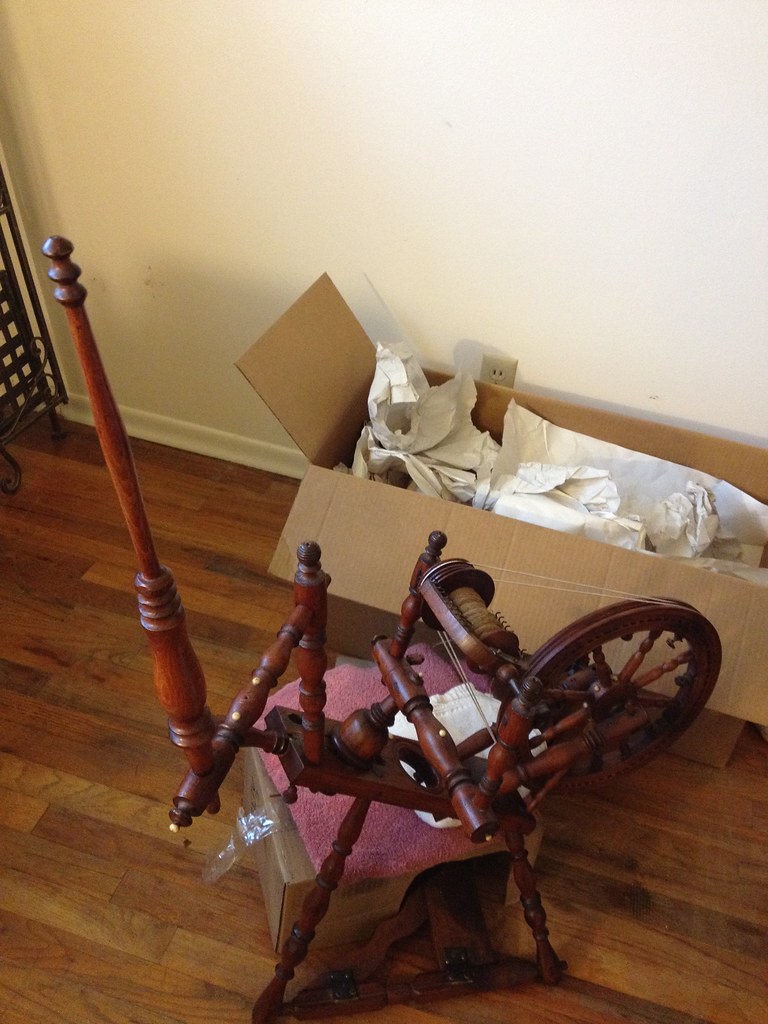 |
| Distaff! |
It has two major breaks - one in the table, and one where a creative soul tried to fix a loose leg with gorilla glue and screws! The bobbin is frozen on the flyer, and the flyer has an old repair where it broke in half, as so many of them do. The condition of the wood it beautiful, and I think that it will be stunning and functional once repaired. I have an appointment with the wheel doctor on Thursday...
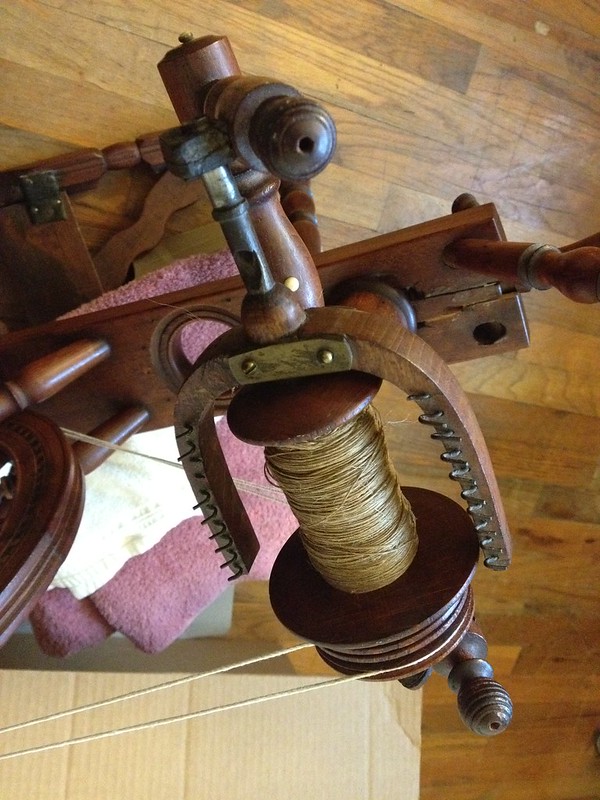 |
| Century-old spun flax on the flyer (with old repair plate) |
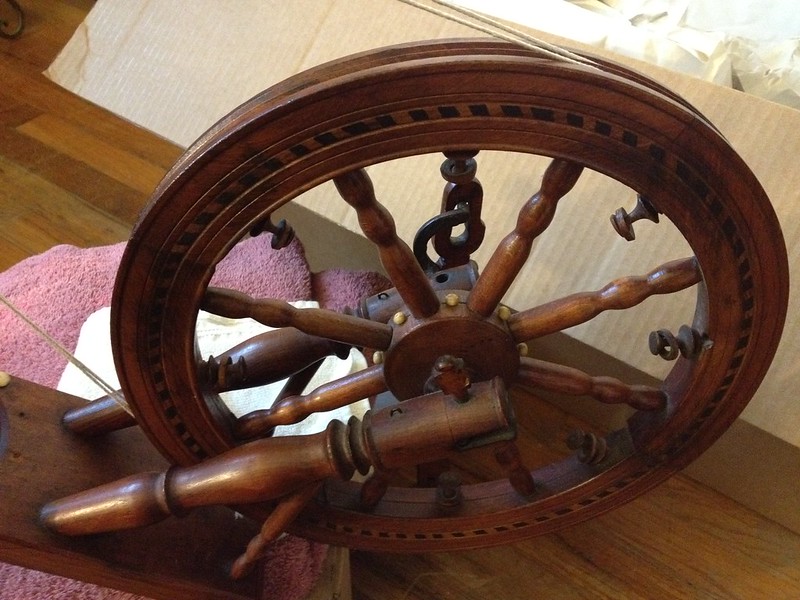 |
| Captive rings! |
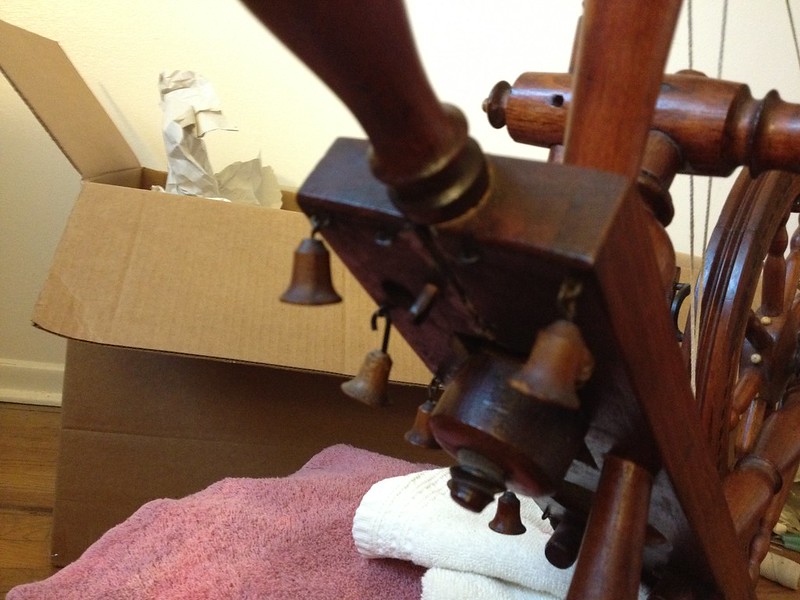 |
| Carved wooden bells! |
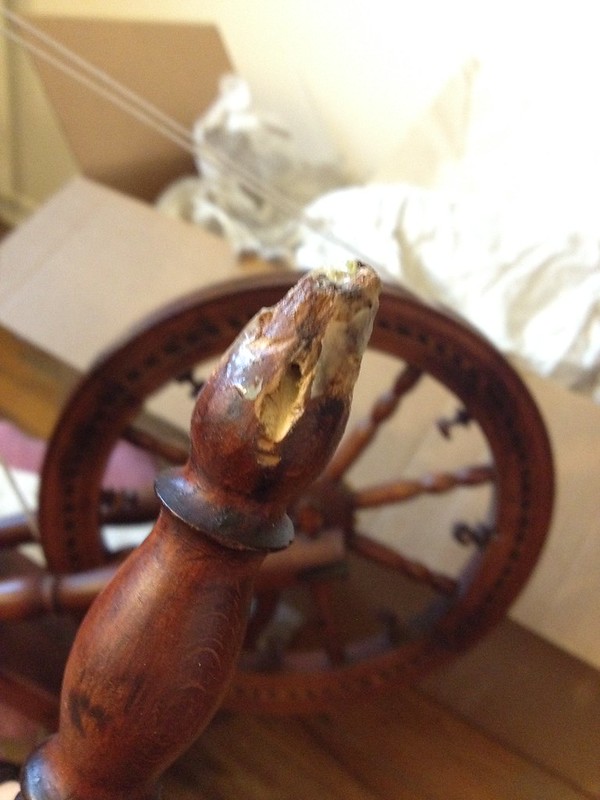 |
| Looks like it was attacked by a beaver, but, no - just dad and an impact driver. |
Wheels come in waves
In the last two weeks, I have obtained my dream wheel, and one whose history and beauty took my breath away. The dream wheel:
He is a Ouellet ("Willet") Canadian production wheel. I named him Germain after many of the men in my grandmother's side of the family, all of whom were living in the same region of Quebec as these wheels were made.
The first time I spun on Germain, it was like he was a part of my body enabling me to spin exactly how I best like to spin - fast, long draw, with big, sweeping arm movements. I tend to get cramped when I sit too long in a closed position, so I spin sidesaddle and keep my hands rather far from the orifice. Big movements, lots of control - they're key for me to stay limber and spin consistently.
The German wedding wheel is up next!
He is a Ouellet ("Willet") Canadian production wheel. I named him Germain after many of the men in my grandmother's side of the family, all of whom were living in the same region of Quebec as these wheels were made.
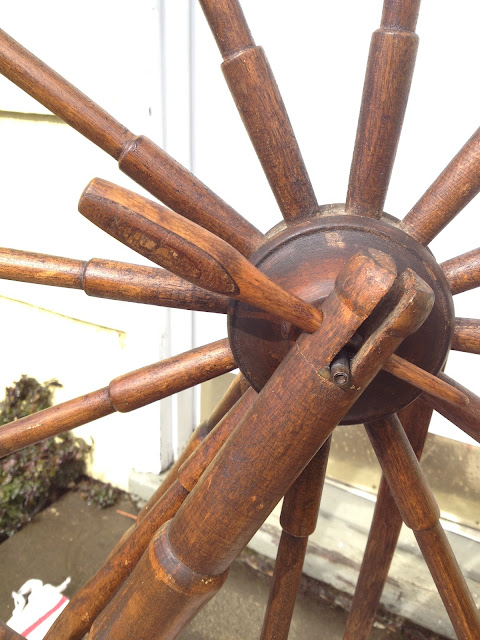 |
| Look at the knot in that retaining pin! |
The first time I spun on Germain, it was like he was a part of my body enabling me to spin exactly how I best like to spin - fast, long draw, with big, sweeping arm movements. I tend to get cramped when I sit too long in a closed position, so I spin sidesaddle and keep my hands rather far from the orifice. Big movements, lots of control - they're key for me to stay limber and spin consistently.
 |
| Border Leicester wool roving spun long draw on Day 1 with the wheel! |
Subscribe to:
Comments (Atom)

.JPG)









